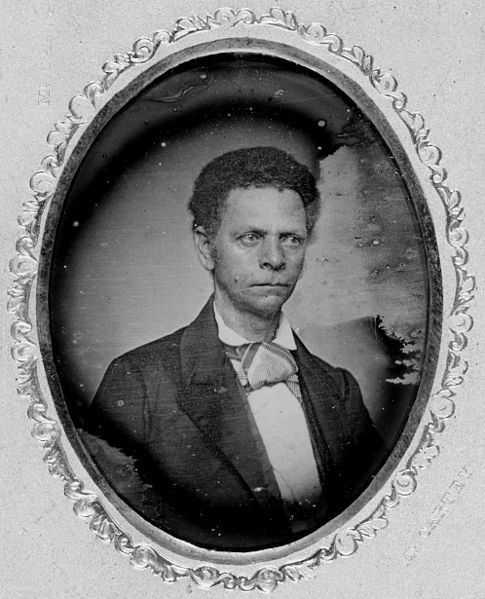In 1846, the governor of the African colony of Liberia, Joseph Jenkins Roberts, called for a referendum to determine Liberia’s path towards independence. Eager colonists in the settlements of Monrovia, Bassa, Greenville, and Maryland affirmed their desire to have an independent Liberia.1 However, the legislature was designated as the final judge to determine the fate of the colony’s future. During this historic moment, Roberts was seeing his vision of independence take shape in reality. The story of Joseph Jenkins Roberts and Liberia’s autonomy was unique among stories of national independence, similar to the United States’ exit from the British Empire in the middle of the 1770s and similar to the Haitian Revolution where slaves revolted against the unfair treatment of the French government.

The story of Roberts’ stride towards obtaining independence for Liberia began when he became the colonial sheriff in 1833.2 One year after he took office, the colony’s main financial supporter and sponsor, the American Colonization Society (ACS), started to experience financial insolvency due to their failure of not being able to secure sufficient funds from the United States federal government and state legislatures. The questionable origins of the ACS and prejudiced motives of a percentage of its members made the organization look unappealing in the eyes of the government. In 1816, the ACS was founded as a product of a growing post-Revolutionary War movement advocating for the emigration of African Americans back to Africa.3 The end result of this emigration was the formation of a new sovereign state.4
Two quite different motives supported the movement of sending blacks back to Africa. The first motive came from southern slave owners who were afraid that those they previously held in captivity might someday rise up against them in an act of revenge. The second motive came mostly from those who resided in the northern United States. They reasoned that blacks could not live peacefully with whites, knowing the sting of discrimination. Also, they reasoned that free blacks brought back to Africa could spread Christianity into the African continent and live economically prosperous lives. Some members of the public did not take kindly to the organization after noticing that southern plantation owners had plans to create a white supremacist state 5
To ensure Liberia’s survival, the colonial legislature imposed taxes on indigenous communities and charged Roberts to enforce these laws. However, he was met with resistance from leaders of these settlements since they claimed that they had sovereignty over the area prior to the arrival of the ACS. This tense situation was fueled by a belief in the idea of Manifest Destiny, which was a belief that the United States had the God-given right to possess the entire continent of North America, suppressing all indigenous populations as needed.6

To accomplish the task given to him by the colonial legislature, Roberts used both diplomacy and zealous enforcement of laws.7 Along with seeing his job as another duty to the government, Roberts also had personal motives for doing his work. Before his arrival in Liberia, he lived in the state of Virginia. His family was composed of educated and financially secure free blacks. However, this did not stop them from experiencing the racial discrimination of Virginia’s black codes, which were the predecessors to Jim Crow laws after the Civil War. Even though he was only 1/8th black, that still made him fully subject to these statutes that restricted where he and his relatives could live and work and who they could marry.8 In 1829, while in Petersburg, Roberts and his family became familiar with the ACS and their activities. They considered what the ACS had to offer as an opportunity to become missionaries of the Gospel and escape the prejudiced laws of their state. Roberts also felt that he might be able to effectively conduct trade between the US and the African west coast.9 After the family’s arrival in the colony, they settled in the city of Monrovia. The family established a trading company to sell raw materials such as ivory and palm plants. The company’s expanding profits allowed the family to purchase ships to conduct trade with maritime merchants in both the North American and African continents. The family also entered into other fields of lucrative white-collar work such as practicing medicine and leading religious assemblies. Roberts himself became an example of his relatives’ upward rise within society when he was appointed sheriff of Liberia by the ACS in 1833. His new life in the colony fulfilled his achievement of economic prosperity, service to God, and ability to participate in government, an opportunity that was not available to him in Virginia since the state barred people of color from voting or holding any political office. This appreciation of a new life in Liberia fueled his drive to preserve the existence of Liberia. This pattern continued through 1841 when he became the colonial governor.10

During his term, he took on the responsibility of unifying various regions, building diplomatic relations with indigenous communities, and imposing tariffs on imported goods. However, European nations and indigenous merchants objected to Roberts’ approach. European nations stated that the settlement was still bound to the ACS, an organization that they did not recognize as a sovereign political authority. Roberts, as a result, called for independence, so that foreign nations would be willing to pay taxes and not invade their land for being in a place of political weakness.11 However, a majority of the colony’s population did not have complete faith in the governor’s vision of independence. This viewpoint resulted from a number of reasons, including the United States deciding to hold a distant relationship with Liberia that became more entrenched during the height of Westward Expansion. This lack of diplomatic relations opened the door for Britain and other European imperialists to take advantage of Liberia’s frailty.12 Another factor included Liberia’s governance under ACS officials. Since the ACS promised that black settlers would live in their own independent nation, those who were the target of those promises believed that they would have a high degree of autonomy.13 However, in 1820, on the Society’s first trip across the Atlantic to move excited settlers to their new home, the promise seemed to appear less realistic than expected. The only three whites on board, an ACS employee, US government employee, and his assistant, treated the black passengers differently from themselves, escalating racial tensions almost to the point of violence. Paternalistic and racist behaviors of ACS employees escalated once onshore. They reduced food rations, seized properties in order to change one city’s landscape, and controlled who was in the legislature, even though they were elected officials.
Some of these patterns continued into Roberts’ governorship.14 With the remembrance of the paternalism and racism of the ACS and Governor Roberts still fresh in the minds of the residents and those memories, combined with the financial implications of forced reliance on the ACS, independence was seen as a distant dream or foolishness.15 The doubts of colonial residents were addressed by Roberts in January 1847. While the Liberian legislature was in session, Roberts urged lawmakers not to accept the degradation of the British government or they would be oppressed.16 The legislature listened to Roberts’ arguments and declared independence in the summer of that year. Because of his leadership, Roberts was elected the president of the new republic in 1848. As a result of declaring independence, the country was recognized by the United Kingdom and a few German states 17.
- Sherry Bowen, “Joseph Jenkins Roberts,” Footsteps 3 no. 1 (2001): 24. ↵
- Global Events: Milestone Events Throughout History, 2014, s.v. “Joseph Jenkins Roberts Becomes the First President of Liberia.” ↵
- Global Events: Milestone Events Throughout History, 2014, s.v. “The American Colonization Society Establishes a Colony for Freed Slaves in Liberia.” ↵
- Eric Bruin, “The Slave Trade Act of 1819: A New Look at Colonization and the Politics of Slavery,” American Nineteenth Century History 13, no. 1 (March 2012): 5, doi:10.1080/14664658.2012.681940. ↵
- Global Events: Milestone Events Throughout History, 2014, s.v. “The American Colonization Society Establishes a Colony for Freed Slaves in Liberia.” ↵
- Brandon Mills, “’The United States of Africa’: Liberian Independence and the Contested Meaning of a Black Republic,” Journal of the Early Republic 34 no. 1 (2014): 80-81. ↵
- Sherry Bowen, “Joseph Jenkins Roberts,” Footsteps 3 no. 1 (2001):24. ↵
- Global Events: Milestone Events Throughout History, 2014, s.v. “Joseph Jenkins Roberts Becomes the First President of Liberia.” ↵
- Sherry Bowen, “Joseph Jenkins Roberts,” Footsteps 3 no. 1 (2001): 24. ↵
- African American Eras: Segregation to Civil Rights Times, 2011, s.v. “Roberts, Joseph Jenkins (1809–1876).” ↵
- Salem Press Encyclopedia, 2019, s.v. “Liberia Proclaims Its Independence,” by Nicholas Birns; Larry J. Reynolds, “Transatlantic Visions and Revisions of Race: Hawthorne, Joseph Jenkins Roberts, and the Editing of Journal of an African Cruiser,” Nathaniel Hawthorne Review 42 no. 2 (2016): 7. ↵
- Larry J. Reynolds, “Transatlantic Visions and Revisions of Race: Hawthorne, Joseph Jenkins Roberts, and the Editing of Journal of an African Cruiser,” Nathaniel Hawthorne Review 42 no. 2 (2016): 7. ↵
- Global Events: Milestone Events Throughout History, 2014, s.v. “The American Colonization Society Establishes a Colony for Freed Slaves in Liberia”; Eric Bruin, “The Slave Trade Act of 1819: A New Look at Colonization and the Politics of Slavery,” American Nineteenth Century History 13, no. 1 (March 2012): 5, doi:10.1080/14664658.2012.681940. ↵
- Amos J. Beyan, “American Colonization Society and the Founding of Liberia,” Vol. 1, Encyclopedia of Race and Racism, ed. by Patrick L. Mason, (Detroit, MI: Macmillan Reference USA, 2013), 88-94. ↵
- Larry J. Reynolds, “Transatlantic Visions and Revisions of Race: Hawthorne, Joseph Jenkins Roberts, and the Editing of Journal of an African Cruiser,” Nathaniel Hawthorne Review 42 no. 2 (2016): 7 ↵
- Brandon Mills, “The United States of Africa’: Liberian Independence and the Contested Meaning of a Black Republic,” Journal of the Early Republic 34 no. 1 (2014): 88. ↵
- Nicholas Birns, “Liberia Proclaims Its Independence,” in Salem Press Encyclopedia, (2019) ↵



17 comments
Giselle Garcia
Joseph Jenkins was determined to help Liberia gain independence and successfully convinced the legislature to declare Liberia independent. When Roberts was appointed sheriff of Liberia, he worked for the benefit of the people, but the Europeans didn’t agree with his decisions. Yet, eventually he was recognized for his efforts and dutiful leadership, and once Liberia was free, he was elected president.
Alondra Lozano
This was a really interesting article. It is amazing to know that Joseph Jenkins tried his best gain the independence for Liberia and for him to achieve a position as President of the new republic. He tried to make it the same as the United States, but no two governments can be run the same. It is sad that many Africans were treated bad and that they had to go through it.
Thiffany Yeupell
To escape the inequality and injustices of one place, only to face similar trials must be quite the bummer. Yet, Roberts was able to have more agency to change the status quo and help lead the process for Liberia’s independence in his position. To have the amount of influence to help address the doubts and reach the legislature, which would ultimately declare independence late on, is substantial, especially considering his history as a foreigner compared to the locals.
Davis Nickle
It’s really incredible to see how hard Jenkins fought for Liberia and how passionately he was for the independence of the country he loved. His boldness should also being commended as he stood up to the ACS which could have ended quite poorly for him. You really have to respect the accomplishments of the man and all of the things he did just to get Liberia’s independence.
Nelly Perez
Jenkins had a plan for his country.Despite the negative things that occurred, there was still something to look forward to due to the dedication and effort that was put in. Jenkins fought hard for independence and he became a leader once the country got its independence. I learned more about Liberia and Robert Jenkins through this article. Great job!
Sara Guerrero
It is amazing to see what Joseph Jenkins for Liberia to help them a step further in gaining independence and it really showed his effort to help the people in the colony. Nowadays, it seems like government officials only care to do something for their own benefit. He was able to look beyond and see the opportunity that he was given to take leadership and give independence to Liberia.
Kendall Guajardo
It is very cool to hear about past leaders who effectively ran their governments with a goal in mind. Jenkins saw more opportunity in Liberia rather than Virginia but even with the fragile relations between the U.S and Liberia, he still managed to send them to independence. This was not only a fight for their livelihood in Liberia but mirrored Jenkins fight for preserving his and his family’s opportunity while living there. For many, there was no other option but to fight to be recognized and gain autonomy which is the reason for so many settlers. It is unfortunate that many settlers were treated badly even after coming to Liberia by the ACS and government officials.